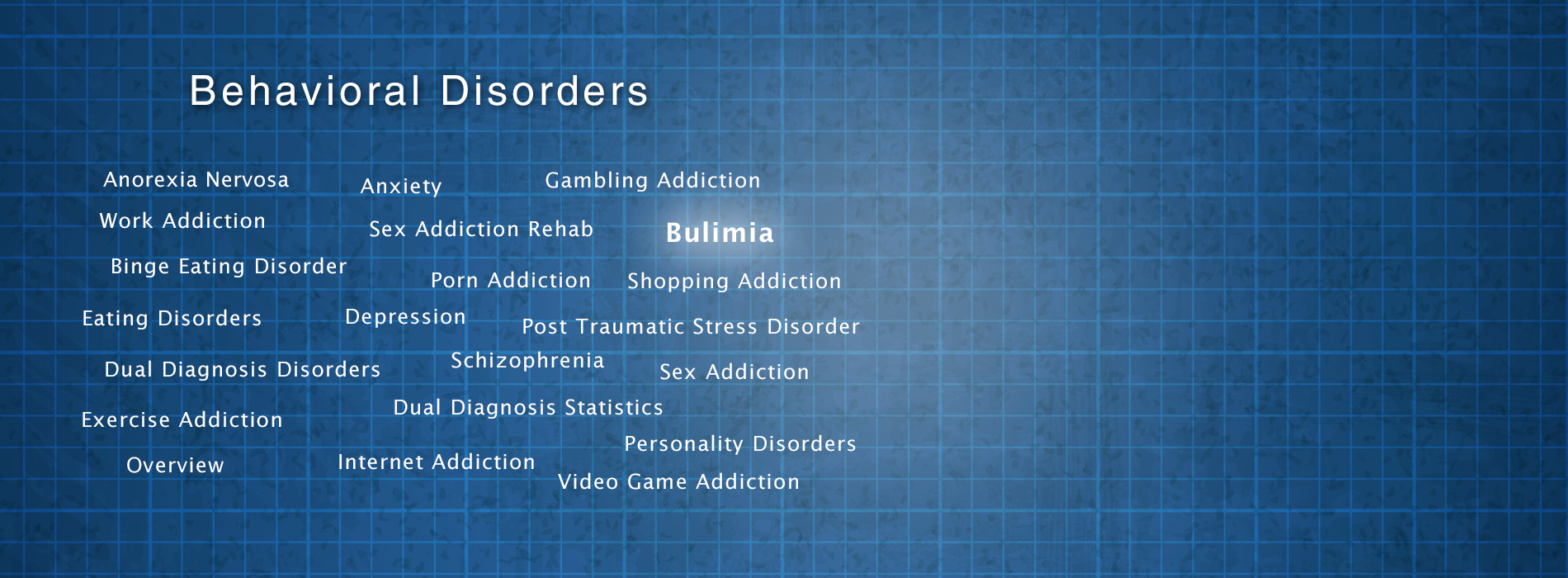Bulimia
Bulimia is an eating disorder primarily characterized by binge eating and subsequent purging. Bulimia sufferers often maintain a weight at or above a healthy range, so the condition is not as visible as anorexia, a related eating disorder. Bulimia is a mental disorder rooted in feelings of low self-esteem related to weight and appearance. It is estimated that bulimia affects 2% to 3% of women at some point in the course of their lives and approximately 0.8% of men.
Bulimia involves frequent episodes of binge eating in which the individual feels out of control of their level of consumption. The binge is them compensated for by purging to avoid weight gain. Purging can take many forms: intentionally vomiting, over-exercising, or taking laxatives, diet pills, or diuretics. In order to receive an official diagnosis, the binge/purge cycle must occur at least once a week for three months. Individuals who don’t meet this requirement may be diagnosed with Other Specified Feeding or Eating Disorder (OSFED). Bulimia is a cycle, ad once the individual has purged, they feel shame and disgust that leads to intense dieting. While dieting, cravings and stress build up until the person experiences another binging episode.
Symptoms of bulimia vary based on the method of purging that the individual performs. Intentional vomiting will result in loss of enamel on the teeth, damage to the esophagus, swollen salivary glands, or lacerations of the throat and mouth due to insertion of objects or fingers. Excessive exercise can result in exhaustion or physical injury. Frequent use of diet pills or laxatives can cause chronic constipation and harm kidney function. Purging of any kind can cause dehydration or electrolyte imbalance, which can have serious effects on heart function and are potentially fatal. Other serious complications include seizures, extreme muscle weakness, and irregular heart beat.
People with bulimia often fixate on the number of calories they have consumed when not in a binging episode. They have low self-esteem and are very self-conscious of their weight. Depression is co-morbid (often occurring together) with bulimia. Other signs include frequent and/or prolonged trips to the bathroom with the water running to cover the sound of vomiting, irregular menstrual cycle in women, and yellowing teeth.
If you suspect that a loved one has bulimia, meet with them in a quiet, private space to talk about it. Show your support for the person and reinforce the fact that you care about them. Avoid language that blames, insults, or scares the person into stopping what they are doing. Remember that bulimia is a mental disorder and encourage the person to seek professional help.
Treatment for bulimia attempts to stop purging behaviors while treating the underlying source of the disorder. Younger patients benefit from treatment that involves their family and helps create a support system for healthy behavior and allowing the patient to take gradual control over their nutritional choices over time. Anti-depressant medications have been shown to have a tentative benefit during treatment for bulimia, but the most effective treatment plan will utilize therapy to help the individual develop a healthy self-image and coping skills that do not include binging.
Bulimia involves frequent episodes of binge eating in which the individual feels out of control of their level of consumption. The binge is them compensated for by purging to avoid weight gain. Purging can take many forms: intentionally vomiting, over-exercising, or taking laxatives, diet pills, or diuretics. In order to receive an official diagnosis, the binge/purge cycle must occur at least once a week for three months. Individuals who don’t meet this requirement may be diagnosed with Other Specified Feeding or Eating Disorder (OSFED). Bulimia is a cycle, ad once the individual has purged, they feel shame and disgust that leads to intense dieting. While dieting, cravings and stress build up until the person experiences another binging episode.
Symptoms of bulimia vary based on the method of purging that the individual performs. Intentional vomiting will result in loss of enamel on the teeth, damage to the esophagus, swollen salivary glands, or lacerations of the throat and mouth due to insertion of objects or fingers. Excessive exercise can result in exhaustion or physical injury. Frequent use of diet pills or laxatives can cause chronic constipation and harm kidney function. Purging of any kind can cause dehydration or electrolyte imbalance, which can have serious effects on heart function and are potentially fatal. Other serious complications include seizures, extreme muscle weakness, and irregular heart beat.
People with bulimia often fixate on the number of calories they have consumed when not in a binging episode. They have low self-esteem and are very self-conscious of their weight. Depression is co-morbid (often occurring together) with bulimia. Other signs include frequent and/or prolonged trips to the bathroom with the water running to cover the sound of vomiting, irregular menstrual cycle in women, and yellowing teeth.
If you suspect that a loved one has bulimia, meet with them in a quiet, private space to talk about it. Show your support for the person and reinforce the fact that you care about them. Avoid language that blames, insults, or scares the person into stopping what they are doing. Remember that bulimia is a mental disorder and encourage the person to seek professional help.
Treatment for bulimia attempts to stop purging behaviors while treating the underlying source of the disorder. Younger patients benefit from treatment that involves their family and helps create a support system for healthy behavior and allowing the patient to take gradual control over their nutritional choices over time. Anti-depressant medications have been shown to have a tentative benefit during treatment for bulimia, but the most effective treatment plan will utilize therapy to help the individual develop a healthy self-image and coping skills that do not include binging.

